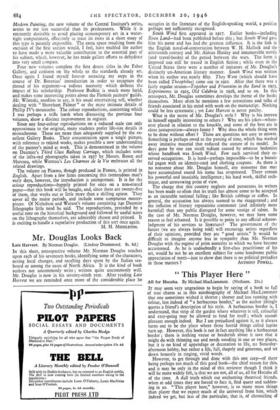Mr. Douglas Looks Back
Late Harvest. By Norman Douglas. (Lindsay Drummond. 8s. 6d.)
IN this short, retrospective volume Mr. Norman Douglas touches upon each of his seventeen books, identifying some of the characters, noting local changes, and recalling days spent by the Italian sea- board or among the oases of North Africa. It is the kind of book authors not uncommonly write ; written quite uncommonly well. Mr. Douglas is now in his seventy-ninth year. After reading Late Harvest we are reminded once more of the considerable place he
occupies in the literature of the English-speaking world, a position perhaps not sufficiently recognised.
South Wind first appeared in 1917. Earlier books—including Siren Land—had been published before this ; but South Wind gave him his name and has had the greatest influence. It is the link in the English novel-of-conversation between W. H. Mallock and the nineteenth century and Mr. Aldous Huxley and innumerable novels (and travel-books) of the period between the wars. The form it imposed can still be traced in English fiction ; while even in the United States there were a number of imitators of Mr. Douglas's distinctly un-American literary manner. South Wind was written when its author was nearly fifty. They Went (which should have been called Theophilus) came out in 1921. After that there was a fairly regular stream—Together and Fountains in the Sand in 1923, Experiments in 1925, Old Calabria in 1928, and so on. In this retrospect, Mr. Douglas sometimes develops the theme of the books themselves. More often he mentions a few corrections and talks of friends associated in his mind with work on the manuscript. Nothing could be less systematic ; yet Late Harvest is never patchy.
What is the secret of Mr. Douglas's style ? Why is his interest in himself equally interesting to others ? Why are his jokes—where- ever placed in relation to the knuckle, and some of the best are in close juxtaposition—always funny ? Why does the whole thing seem to be done without effort ? These are questions not easy to answer. Something is perhaps owed to the passing of time, which has washed away imitative material that reduced the stature of its model. ,In days gone by one can recall tedium caused by amateur hedonists whose handbook was South Wind. Few such survived their re- served occupations. It is hard—perhaps impossible—to be a beauti- ful pagan with an identity-card and clothing coupons. As there is no nonsense about Mr. Douglas himself, any nonsense that may have accumulated round his name has evaporated. There remain his powerful and insatiable intelligence ; his hard work, skilful tech- nique, and unwavering point of view.
The charge that this country neglects and persecutes its writers has been made so often that its truth has almost come to be accepted as an incurable national failing ; like British cabbage or coffee. In general, the accusation has always seemed to me exaggerated ; and the inflation of literary reputations commoner (and infinitely more harmful) than any public disregard for some vestige of talent. In the case of Mr. Norman Douglas, however, we may have some reason to feel ashamed. Is it possible to point to any official acknow- ledgment of his services to literature? The government of the future (we are always being told) will encourage artists regardless of their opinions, provided they are " good artists." It would be difficult to imagine anyone less in sympathy than Mr. Norman Douglas with the regime of prim austerity to which we have become accustomed. As he is undoubtedly a first-class practitioner of his art, would he not be an excellent subject for some handsome public appreciation of merit—just to show that there is no political prejudice


































 Previous page
Previous page